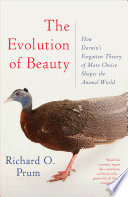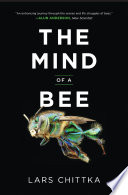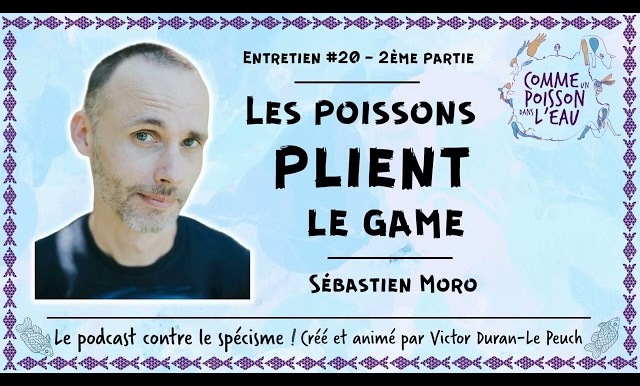Description
Voici la seconde partie de cet entretien avec Sébastien Moro sur les poissons. On y parle de l'expérience du miroir que les labres nettoyeurs passent haut la main, de la vie sociale des poissons, de leurs traditions, leur vie de couple, et leur sexualité ! En somme, il est plus que temps de cesser de penser que les poissons seraient des "êtres inférieurs". Non non, les poissons plient le game !
Crédits
Comme un poisson dans l'eau est un podcast indépendant créé et animé par Victor Duran-Le Peuch. Charte graphique : Ivan Ocaña Générique : Synthwave Vibe par Meydän Musique : Last Summer par Ikson
2 livres cités :
The Evolution of Beauty · How Darwin's Forgotten Theory of Mate Choice Shapes the Animal World - and Us Richard O. Prum

The Evolution of Beauty presents a unique scientific vision for how nature's splendor contributes to a more complete understanding of evolution and of ourselves.
ISBN : 9780385537223 · publié le 9 mai 2017
Description complète et liste des 1 épisode(s) qui le citent
A FINALIST FOR THE PULITZER PRIZE NAMED A BEST BOOK OF THE YEAR BY THE NEW YORK TIMES BOOK REVIEW, SMITHSONIAN, AND WALL STREET JOURNAL A major reimagining of how evolutionary forces work, revealing how mating preferences—what Darwin termed "the taste for the beautiful"—create the extraordinary range of ornament in the animal world. In the great halls of science, dogma holds that Darwin's theory of natural selection explains every branch on the tree of life: which species thrive, which wither away to extinction, and what features each evolves. But can adaptation by natural selection really account for everything we see in nature? Yale University ornithologist Richard Prum—reviving Darwin's own views—thinks not. Deep in tropical jungles around the world are birds with a dizzying array of appearances and mating displays: Club-winged Manakins who sing with their wings, Great Argus Pheasants who dazzle prospective mates with a four-foot-wide cone of feathers covered in golden 3D spheres, Red-capped Manakins who moonwalk. In thirty years of fieldwork, Prum has seen numerous display traits that seem disconnected from, if not outright contrary to, selection for individual survival. To explain this, he dusts off Darwin's long-neglected theory of sexual selection in which the act of choosing a mate for purely aesthetic reasons—for the mere pleasure of it—is an independent engine of evolutionary change. Mate choice can drive ornamental traits from the constraints of adaptive evolution, allowing them to grow ever more elaborate. It also sets the stakes for sexual conflict, in which the sexual autonomy of the female evolves in response to male sexual control. Most crucially, this framework provides important insights into the evolution of human sexuality, particularly the ways in which female preferences have changed male bodies, and even maleness itself, through evolutionary time. The Evolution of Beauty presents a unique scientific vision for how nature's splendor contributes to a more complete understanding of evolution and of ourselves.
Cité dans 1 épisode(s) :The Mind of a Bee Lars Chittka

But do we know how uniquely intelligent bees are as individuals? In The Mind of a Bee, Lars Chittka draws from decades of research, including his own pioneering work, to argue that bees have remarkable cognitive abilities.
ISBN : 9780691253893 · publié le 10 octobre 2023
Acheter sur Place des LibrairesDescription complète et liste des 1 épisode(s) qui le citent
A rich and surprising exploration of the intelligence of bees Most of us are aware of the hive mind—the power of bees as an amazing collective. But do we know how uniquely intelligent bees are as individuals? In The Mind of a Bee, Lars Chittka draws from decades of research, including his own pioneering work, to argue that bees have remarkable cognitive abilities. He shows that they are profoundly smart, have distinct personalities, can recognize flowers and human faces, exhibit basic emotions, count, use simple tools, solve problems, and learn by observing others. They may even possess consciousness. Taking readers deep into the sensory world of bees, Chittka illustrates how bee brains are unparalleled in the animal kingdom in terms of how much sophisticated material is packed into their tiny nervous systems. He looks at their innate behaviors and the ways their evolution as foragers may have contributed to their keen spatial memory. Chittka also examines the psychological differences between bees and the ethical dilemmas that arise in conservation and laboratory settings because bees feel and think. Throughout, he touches on the fascinating history behind the study of bee behavior. Exploring an insect whose sensory experiences rival those of humans, The Mind of a Bee reveals the singular abilities of some of the world’s most incredible creatures.
Cité dans 1 épisode(s) :5 autres références :
- Étude de Chloé Laubu sur l'optimisme ou le pessimisme des poissons selon si les duos de poissons sont ensemble ou non (www.researchgate.net)
- Étude finale dont le titre passe au conditionnel (journals.plos.org)
- Le film Cloud Atlas, réalisé par Lana & Lilly Wachowski (film)
- Preprint de l'étude du miroir qui dit que les labres nettoyeurs le passent (www.biorxiv.org)
- Vidéo cervelle d’oiseau sur le sens électrique des poissons-chat (video)
 Comme un poisson dans l’eau
Comme un poisson dans l’eau
